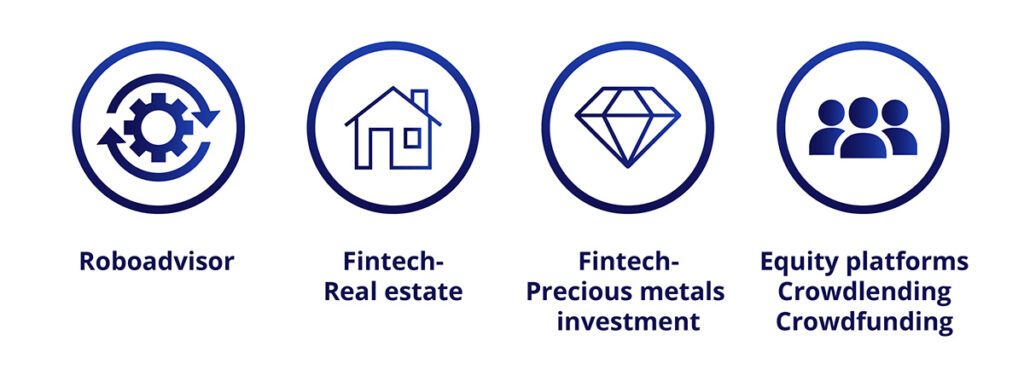With the arrival of technology, the banking sector has undergone a process of digital transformation. If in the past we only knew traditional banks, technology has allowed new players to emerge in the financial space, such as neobanks and Fintech companies. Technology has made investing more accessible to retail investors.
In this article, we’ll discuss the impact of Fintech on investments.
What is a Fintech?
A Fintech is a company that leverages innovative technology to provide financial services more efficiently and at lower costs.
There are many types of Fintech companies, but in this article, we will focus specifically on investment Fintechs.
Investment Fintechs are companies that offer savings and investment services powered by technology, competing directly with traditional banking investment instruments. Depending on the client’s risk profile, they provide a diversified investment portfolio with returns and risks tailored to that profile.
Within investment Fintechs, we can distinguish four main groups:

- Robo-advisors
- Fintechs providing access to real estate markets
- Fintechs that enable investment in physical gold and other precious metals
- Equity, crowdlending, and crowdfunding platforms
Robo-advisors
Robo-advisors are Fintechs dedicated to automated portfolio management. They allow both financial advisors and investors to access index-based or ETF portfolios across different asset classes.
The process typically begins with an online questionnaire designed to assess the investor’s financial goals, wealth situation, financial knowledge, and risk tolerance. Based on the responses, a risk profile is generated. This profile determines the level of risk and the expected long-term return of the most suitable portfolio.
From there, a tailored portfolio is automatically constructed, allocating transferred funds across a diversified selection of index funds or ETFs. These may include U.S. or European equities, other international markets, fixed income indices, commodities such as gold, or real estate assets.
Portfolios are automatically rebalanced at regular intervals, depending on how each fund or ETF performs, to maintain the original asset weightings.
This automation significantly reduces management costs compared to actively managed portfolios, while also allowing small amounts to be invested across a wide range of global assets—something that, until recently, was only accessible to high-net-worth individuals.
Lower management fees have been a key factor behind robo-advisors outperforming most actively managed funds over the past 15 years. Over time, lower fees translate into higher net returns compared to active management. However, passive strategies tend to perform best in bullish markets and may underperform during downturns, as they lack defensive mechanisms to rotate into safer assets.
Examples of robo-advisors include Indexa Capital, InbestMe, and Finizens, among others.

Fintechs Providing Access to Real Estate
Traditionally, real estate investment was reserved for wealthy investors, as buying a property—whether residential or commercial—requires significant capital, not to mention transaction costs.
Thanks to technology, Fintech platforms such as Urbanitae now allow fractional real estate investment with small amounts of capital. This means that any retail investor can gain exposure to real estate assets without needing a large portfolio.
Through real estate crowdfunding platforms, investors provide capital to property developers to finance projects such as construction or renovation, which are later sold. In this case, returns come from the repayment of the principal plus interest. Alternatively, investors can participate in buy-and-rent operations, earning income from rental yields and long-term property appreciation.

Fintech Platforms for Gold and Precious Metals
Traditionally, investing in physical gold or precious metals like silver and platinum was limited to wealthy investors.
Today, Fintech platforms make it possible to purchase fractional ownership of gold or precious metals stored in vaults in cities like London or Zurich, with small ticket sizes, opening access to retail investors.

Equity, Crowdlending, and Investment Crowdfunding Platforms
Business Angels typically invest in a portfolio of 15–20 startups, requiring substantial capital. For retail investors, this was historically out of reach. However, with equity crowdfunding platforms, anyone can now build a diversified startup portfolio by committing small amounts to each venture. Platforms such as Crowdcube, Seedrs, and Capital Cell make this possible.
In crowdlending platforms, retail investors lend capital directly to companies or projects. These platforms list loan opportunities, and investors can select and fund portions of them. Returns come from interest payments. Previously, this type of private debt investment was exclusive to professional investors through specialized funds.
Another alternative market opened by Fintech is contemporary art investment. Traditionally restricted to high-net-worth collectors, it is now possible to invest via platforms such as Masterworks, which acquire artworks and tokenize ownership into fractional shares. Investors earn returns when the artwork is sold, minus the platform’s commission.

Conclusion: Democratizing access to investment
Fintech has reshaped the investment landscape by democratizing access for retail investors to a wide range of assets that were previously exclusive to professionals or high-net-worth individuals.
Some of the key impacts of Fintech on retail investors include:
- Access to alternative markets
- Ability to invest with small amounts
- Portfolio diversification with both traditional and alternative assets
Investing in both traditional and alternative assets is no longer a privilege reserved for a few—it’s now a choice available at the click of a button. Thanks to Fintech, the path is open: the next step is yours.
What’s Next?
- Explore platforms aligned with your investment goals
- Define your risk profile and start small
- Diversify and continue improving your financial literacy as you invest
If you have any questions, I’d be happy to discuss them with you.





